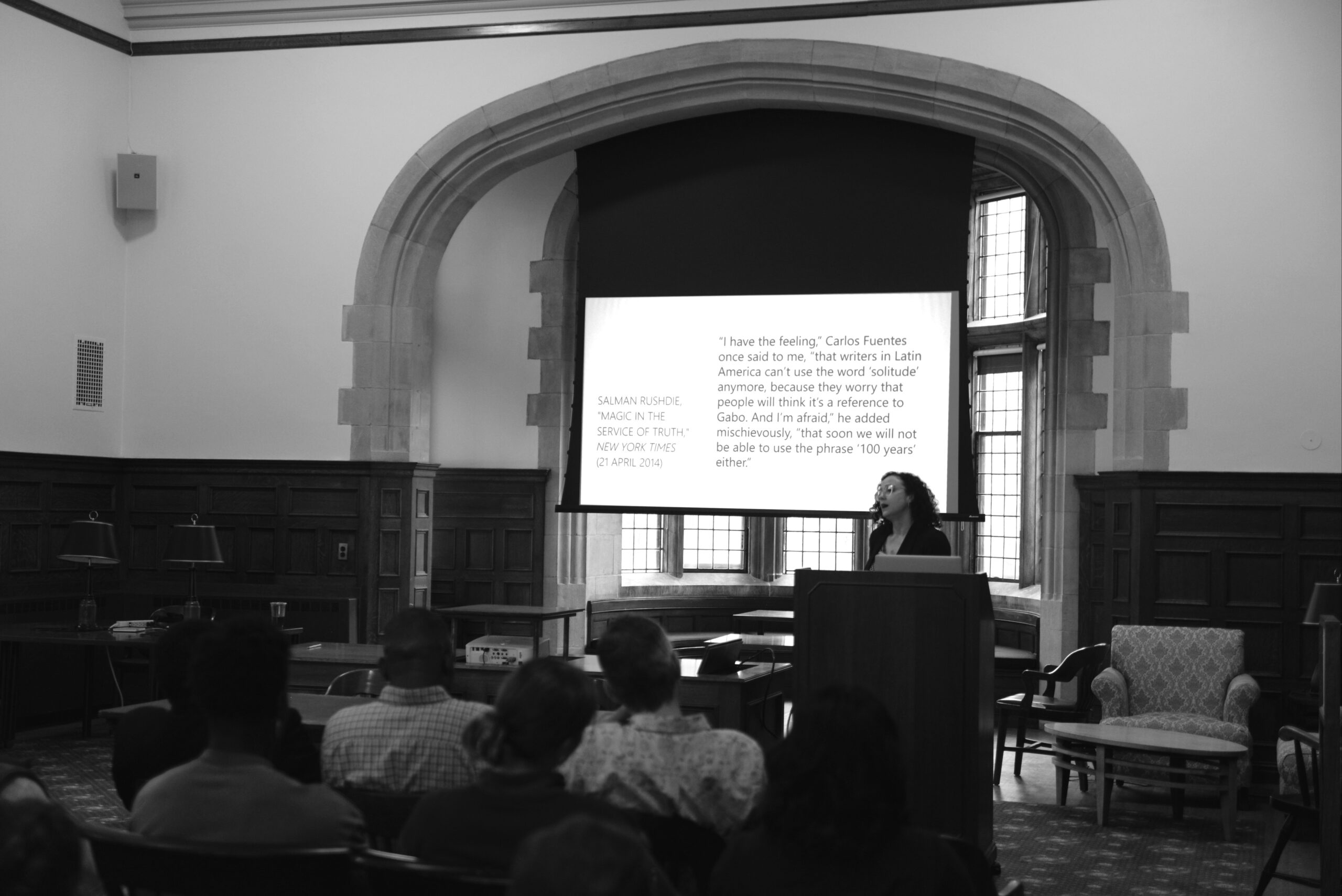Speaker Magali Armillas-Tiseyra discusses reverberations of Latin American literary boom
September 30, 2022
 Cora Dow
Cora DowStudents gathered in the Shannon Room on Wednesday afternoon to hear from Magali Armillas-Tiseyra on author Gabriel Garcia Marquez’s modern literary influence.
Armillas-Tiseyra is an Associate Professor of Comparative Literature at Pennsylvania State University and the author of “The Dictator Novel: Writers and Politics in the Global South.” In her speech, “The Legacies of the Latin American ‘Boom,’” Armillas-Tiseyra discussed the legacy of Garcia Marquez’s 1967 “One Hundred Years of Solitude,” which students in a Hispanic Studies seminar on Garcia Marquez are reading now.
“One Hundred Years of Solitude,” Armillas-Tiseyra posited, was a key driver of the Latin-American literary boom, during which sales of Latin American literature increased substantially and writers such as Garcia Marquez and Carlos Fuentes garnered international acclaim.
“It’s both political and historical events and aesthetic innovations that come together in this moment to establish an idea of what Latin American literature is at the international level. And Garcia Marquez is really at the forefront of that,” Armillas-Tiseyra said.
Armillas-Tiseyra focused her speech on the literary boom’s modern resonances. African writers have achieved major literary success in recent years, so much so that the New York Times labeled 2021 “the year for African literature.” Armillas-Tiseyra noted that the success of African writers is deeply connected to Garcia Marquez’s continued influence.
“Repeated invocations of the names Garcia Marquez and ‘One Hundred Years of Solitude’ suggest the extent to which these have become floating signifiers of literary prestige for writers from the Global South,” Armillas-Tiseyra said. “The more easily your work can be compared to [Garcia Marquez] … the more easily it enters the circuits of global literary dissemination.”
In some cases, Armillas-Tiseyra explained, modern writers directly allude to Garcia Marquez. In “The Old Drift,” a 2019 novel by Zambian writer Namwali Serpell, a character opens an HIV treatment center called the One Hundred Years Clinic, a direct nod to Garcia Marquez. More broadly, many recent African novels have drawn upon Garcia Marquez’s magical realist style.
Garcia Marquez’s modern influence goes beyond literary references, Armillas-Tiseyra noted, and often takes the form of similar critiques of dictatorial government structures.
“African writers are not just looking to the Latin Americans for a model that they immediately reproduce,” Armillas-Tiseyra said. “They’re looking to Latin Americans for ways of thinking about the problems that they are confronting themselves.”
Ryan Kovarovics, ’23 a student in a Hispanic Studies seminar attending Armillas-Tiseyra’s speech, noted his excitement to connect the books he is currently reading to more recent innovations in literature.
“I’m really interested in hearing about the ways that the boom [appears] in modern writing as well, because this is a really significant historic time in Latin American literature,” Kovarovics said.
Kovarovics and the other students in Celis’ seminar had the opportunity to speak with Armillas-Tiseyra at lunch on Wednesday about her current research on how Latin American literature from the mid-20th century has been uniquely powerful, but also challenging, for authors from the Global South.
Some of these writers, Armillas-Tiseyra explained, have had to grapple with—and even reject—comparisons to Garcia Marquez that may reduce their work to “stereotypes.”
“Gabriel Garcia Marquez is a colossus to be topped,” Armillas-Tiseyra said. “Contemporary African writers do register Gabriel Garcia Marquez’s global influence … as one of many points of reference to think about the status of, and possibilities for, African writing today.”
Kovarovics noted that hearing from Armillas-Tiseyra allowed him to think more deeply about the connection between the period in which Garcia Marquez was writing and the modern political landscape of literature.
“It’s really interesting to think about the way that [Garcia Marquez’s] writing has influenced other writers throughout the world and then also represents this Latin American post-colonial identity,” Kovarovics said.

Comments
Before submitting a comment, please review our comment policy. Some key points from the policy: